
Sea Truce and Energy Attack Ban: Russia-Ukraine Agreement
Russia and Ukraine have recently reached an agreement to halt military operations in the Black Sea and to suspend attacks on each other’s energy infrastructure. This development follows negotiations mediated by the United States in Riyadh, Saudi Arabia.
Key aspects of the agreement include:
- Black Sea Ceasefire: Both nations have consented to “ensure safe navigation, eliminate the use of force, and prevent the use of commercial vessels for military purposes” in the Black Sea.
- Moratorium on Energy Infrastructure Strikes: A 30-day suspension of attacks on energy facilities, including oil refineries and nuclear stations, has been established, effective from March 18, 2025.
However, the implementation of the Black Sea truce is contingent upon the lifting of specific Western sanctions against major Russian companies, particularly those involved in agricultural trade. The Kremlin has stipulated that the ceasefire will “enter into force after the lifting of sanctions on Rosselkhozbank and other financial institutions involved in providing international trade operations in food and fertilizers.”
Ukrainian President Volodymyr Zelensky has expressed reservations about easing economic pressure on Moscow, fearing it could weaken the West’s stance. Critics argue that the agreement may disproportionately benefit Russia by facilitating its exports without securing substantial concessions for Ukraine.